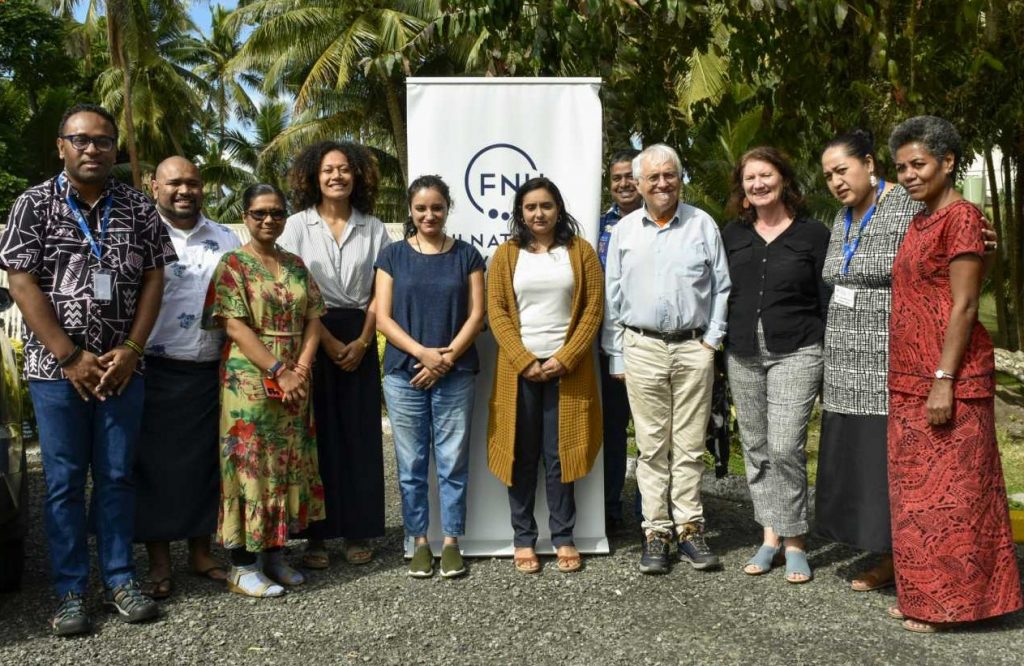

L-R: Mr Apenisa Tamani (SPC), Mr Ralph Buadromo (FNU), Dr Ravita Prasad (CETVET), Ms Susana Vulawalu (C4C), Dr Shipra Shah(CAFF), Dr Shalini Singh (CAFF), Mr Roneel Kumar (PIDF), Dr Gilbert David (IRD), Ms Patricia Parkinson (ELOC), Ms Ikatonga Hingani (SPC), Ms Timaima Racule (FNU) at the workshop
The Fiji National University (FNU), in collaboration with regional and international partners, has successfully launched Phase 1 of the EU-funded RERIPA Call 4 Project.
The phase began with the pre-production of learning materials, starting with the RERIPA Call 4 Micro-Credential Workshop.
The workshop, themed “Collaborative Pathways: Enhancing Pacific Education and Innovation for Climate Resilience,” is a critical step in the development of micro-credentials aimed at addressing specific skill gaps and providing flexible, regionally recognised learning opportunities.
Manager Project Timaima Racule said the first session of the workshop, held on August 14th, introduced the concept of micro-credential development.
“FNU hosted the workshop under the auspices of the Institut de Recherche pour le Développement (IRD), Organisation of African Caribbean and Pacific States (OACP), and the European Union (EU) and Facilitated by the South Pacific Community (SPC) Educational Quality and Assessment Programme (EQAP) officer Mr. Apenisa Tamani,” Racuule said.
“The primary focus of this session was to guide Subject Matter Experts (SMEs) in aligning micro-credential frameworks with SPC accreditation requirements and standards.
“This alignment is crucial for ensuring that the developed micro-credentials gain the necessary recognition both locally and regionally.”
Timaima said the workshop’s overarching goal is to prepare and align relevant programmes and courses for micro-credentials, which are vital in addressing the unique challenges faced by Pacific Island nations due to climate change.
“These micro-credentials will be tailored to the specific contexts of the region, ensuring that the knowledge and skills imparted are directly applicable to the local communities and industries most affected by environmental changes and economic vulnerabilities. The upcoming sessions on September 10th and 11th will focus on refining and submitting the micro-credentials, with inputs from a stakeholders’ workshop scheduled for 03 and 04 September, further ensuring that the programmes meet the accreditation criteria,” she said.
“In attendance at the inaugural session was Dr Gilbert David, the newly appointed Scientific Director of the EU-funded RERIPA Project, effective since March 2024. Dr David, who holds a Master’s degree and a Ph.D. in Marine Geography from the University of Western Brittany, France, brings extensive expertise in marine geography, fisheries, and coastal systems. His involvement in the workshop reflects the EU’s commitment to ensuring that the RERIPA Call 4 Project addresses both local and regional needs, particularly in enhancing resilience against climate impacts. Dr David, who was on an in-country visit to Fiji, expressed his excitement about the development of these micro-qualifications, highlighting their practical application to local communities and industries.
“The workshop also brought together key FNU Subject Matter Experts, including Dr Shipra Shah, Dr Shalini Singh from the College of Agriculture, Fisheries and Forestry, and Dr Ravita Prasad(CETVET), along with consortium partners such as Ms Patricia Parkinson from Environmental Law Oceania Consultancy (ELOC), Ms Susana Vulawalu from Corals for Conservation, Dr Gail Riches from Trinity College in Australia, and Mr John Rofeta from Solomon Islands National University (SINU). Their collective efforts are set to drive the success of the RERIPA Call 4 Project, positioning FNU and its partners as leaders in climate resilience education in the Pacific.”